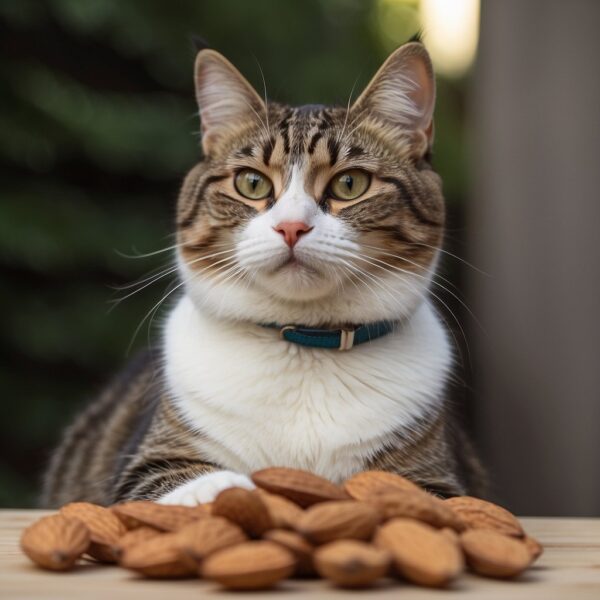
Cats eating Almonds? Nut Concerns for Cats
When it comes to feline diets, the question of whether cats can safely eat almonds is one that deserves attention. While almonds are not considered toxic to cats, they are not ideally suited to a cat’s dietary needs. Cats are obligate carnivores, which means their nutrition should predominantly come from protein sources, primarily meat. Almonds, on the other hand, are high in fats and proteins that are more suitable for humans than felines.
It is also worth considering that almonds potentially pose health risks to cats. The size and hardness of almonds can lead to choking hazards or obstructions in the digestive tract. Additionally, almonds contain natural compounds that can be difficult for cats to digest, potentially leading to an upset stomach or more serious gastrointestinal issues.
Key Takeaways
- Almonds are not toxic to cats, but they are not an ideal food for them due to their nutritional composition.
- There are potential health risks, such as choking and digestive issues, when cats consume almonds.
- It is important to focus on a protein-rich diet that caters to a cat’s carnivorous nature and avoid human foods that offer no nutritional benefit to felines.
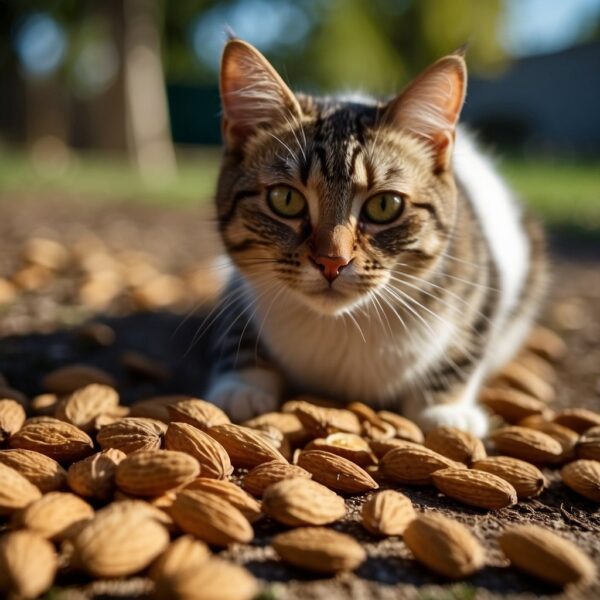
Facts About Almonds and Cats eating almonds
When considering whether cats can eat almonds, it is essential to understand the potential risks and nutritional aspects of almonds. Two main points of concern are the presence of toxic components in certain almonds and their overall nutritional profile, which may not be suited to a cat’s dietary needs.
Toxic Components in Almonds
Cyanide: Some almonds, specifically bitter almonds, contain cyanogenic glycosides, which can release cyanide when ingested. Cyanide is highly toxic to cats, even in small amounts, and can lead to cyanide poisoning.
Cyanogenic Glycosides: This compound is found naturally in several plants including bitter almonds. When bitter almonds are crushed or chewed, an enzyme interacts with cyanogenic glycosides, releasing cyanide, and posing a health risk for cats.
Nutritional Profile of Almonds
Fiber: Almonds contain a significant amount of dietary fiber. While fiber can offer benefits for the digestive system, cats obtain most of their dietary requirements from meat and may not benefit from the plant-based fiber in almonds.
Vitamin E and Antioxidants: Almonds are high in vitamin E and antioxidants, which are beneficial to humans. However, the caloric and fat content of almonds, along with the fact that cats are obligate carnivores, makes them an impractical source of such nutrients for feline diets.
Unsaturated Fats: These are present in almonds and are a source of energy and support for cell structure. But the high fat content can be difficult for cats to digest and may lead to gastrointestinal issues or contribute to obesity.
Plant Proteins: Regardless of almonds containing plant proteins, cats require animal-based proteins to thrive, which have the necessary amino acid profile that cats need. Plant proteins alone are insufficient for a cat’s nutritional needs.
Almond Butter: Like whole almonds, almond butter may contain similar nutritional elements but also presents similar risks. Its creamy consistency does not mitigate the potential dangers associated with the consumption of almonds by cats.
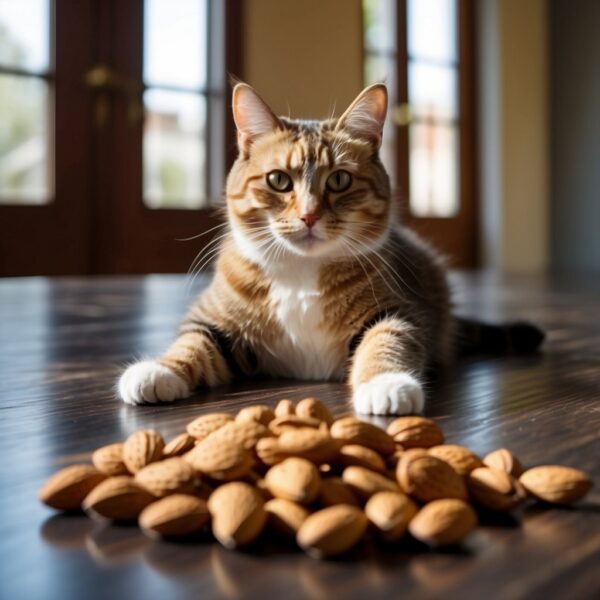
Health Risks of cats eating almonds
Almonds pose significant health risks for cats due to their potential to cause cyanide poisoning, their high fat content, and their likelihood to disrupt the feline digestive system.
Cyanide Poisoning Symptoms
Cats that consume almonds may be at risk of cyanide poisoning, as these nuts contain cyanogenic glycosides which can release cyanide when ingested. Symptoms of cyanide poisoning in cats include:
- Vomiting
- Respiratory distress
- Increased heart rate
- Collapse
cats eating almonds: Risks Associated with Fats
Almonds are high in fats and calories, which can be detrimental to a cat’s health. Excessive intake of fats may lead to:
- Pancreatitis: An inflammation of the pancreas causing abdominal pain and vomiting.
- Obesity and associated complications like diabetes and inflammation.
- Increased risk of fatty liver disease and cholesterol issues, potentially impacting heart health.
Digestive Issues from cats eating almonds
Cats have a digestive system that is not designed to process nuts like almonds effectively, leading to:
- Upset stomach and diarrhea, as the feline gut is shorter and lacks the digestive enzymes necessary for almond breakdown.
- Risk of choking or gastrointestinal blockage due to the size and shape of almonds.
- Possibility of an allergic reaction, albeit rare, which could result in skin irritations or gastrointestinal distress.
Alternatives to Almonds for Cats
While almonds are not suitable for cats, there are various safe and nutritious alternatives that cater to a cat’s dietary needs and preferences.
Safe Treat Options
When considering treats for cats, the primary focus should be on their unique nutritional requirements. Cats are obligate carnivores and require high-quality animal protein for optimal health. Some safe treat options include:
- Cooked Meat: Small pieces of cooked chicken or turkey can be excellent treats. Ensure they are free from any sauces or seasonings.
- Commercial Cat Treats: These are specifically formulated for cats, taking into account their dietary needs and are often fortified with vitamins and minerals.
Healthy Alternatives and Supplements
To supplement a cat’s diet, pet owners may consider offering:
- Healthy Fats: Incorporating healthy fats like omega-3 fatty acids, which can be found in fish-based cat foods or supplements, is beneficial for a cat’s skin and coat.
- Vegetables: Some cats may enjoy small amounts of steamed vegetables, such as broccoli or carrots, which offer additional nutrients and fiber.
It is critical to avoid overfeeding treats to prevent obesity, which is a common health concern in cats. Treats, including these healthier alternatives, should constitute no more than 10% of a cat’s daily caloric intake.
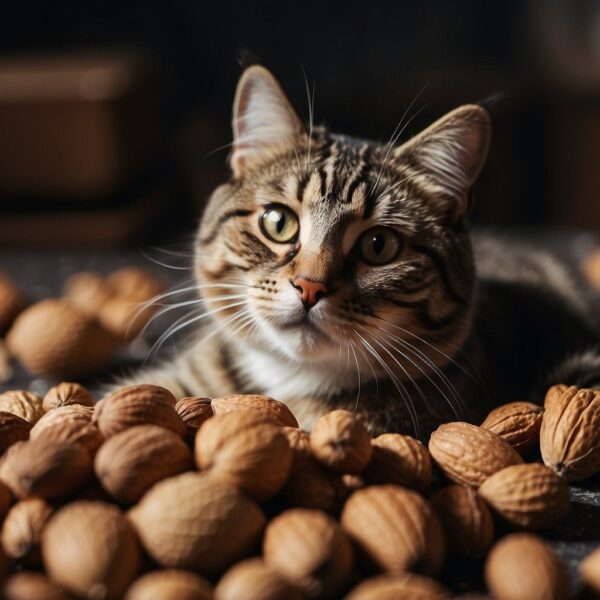
Prevention and Safety Measures
Ensuring a cat’s safety involves understanding potential dietary hazards and consulting professionals for health guidance. This section explains how to recognize foods that can be harmful to cats, such as almonds, and emphasizes the importance of professional veterinary advice.
Recognizing and Avoiding Harmful Foods like Almonds
Cats may display curiosity towards various foods, including nuts like almonds. Almonds, especially bitter almonds, may contain compounds leading to toxicity and potentially life-threatening conditions. Sweet almonds aren’t toxic, but can still pose risks such as choking or gastrointestinal issues. Almonds, in general, are considered bad for cats and can cause adverse reactions such as allergies.
- To prevent accidental ingestion, store almonds and similar nuts out of reach.
- Be aware of foods that may contain almond ingredients.
- Educate everyone in the household about the dangers certain foods pose to pets.
Consultation with a Veterinarian
Regular consultation with a veterinarian is paramount for a cat’s well-being. They provide professional insight into potential allergies and guidelines for a safe, cat-friendly diet.
- Consult a veterinarian immediately if accidental almond ingestion occurs.
- Inquire about safe dietary alternatives to ensure a cat’s nutritional needs are met.
- Veterinarians can offer individualized advice based on a cat’s specific health profile, including safe treats and foods to avoid.
Understanding Human Foods and Cats
When considering sharing a meal with feline friends, one must distinguish between safe treats and harmful foods. Cats have specific dietary needs and can react negatively to certain human foods.
Common Human Foods That Are Harmful
Chocolate: It contains theobromine, a compound that is toxic to cats and can lead to vomiting, diarrhea, and even more severe health issues.
Almonds and almond-based products like almond milk and almond butter: While not toxic, they can cause gastrointestinal upset in cats. Almonds also contain oils and fats which can lead to obesity and pancreatitis.
Aspartame: This artificial sweetener, found in some diet foods and sodas, can be toxic to animals, though there are not many cases involving cats.
Lactose intolerance: Many cats are lactose intolerant, which means dairy products can cause digestive distress.
Peanuts: Similar to almonds, peanuts are not necessarily toxic but can cause gut obstruction and are also high in fats that can upset a cat’s stomach.
| Harmful Food | Possible Effect |
|---|---|
| Chocolate | Heart rate increase, severe health issues |
| Almonds, Almond Milk, Almond Butter | Gastrointestinal upset, obesity, pancreatitis |
| Aspartame | Can be toxic, uncommon in cats |
| Dairy Products | Diarrhea, stomach pain |
| Peanuts | Gut obstruction, digestive problems |
Safe Human Foods for Cats
Cooked fish: Fish should be cooked to prevent the risk of parasites. White fish like cod or tilapia can be a good source of protein.
Cooked lean meats: Small, controlled portions of cooked lean meats like chicken or turkey are typically safe.
It’s important to note that while certain human foods are deemed safe, they should not replace a nutritionally complete feline diet.
Note: Always consult with a veterinarian before introducing new foods into your cat’s diet.
| Safe Food | Benefits |
|---|---|
| Cooked White Fish | High-protein, low-fat |
| Cooked Lean Meats | Good protein source, palatable |
While not all cats will have adverse reactions to almonds, their ingestion can lead to health complications, such as salt buildup affecting blood pressure and overall well-being. Cat parents should consider these risks carefully and prioritize a cat’s health by avoiding almonds.
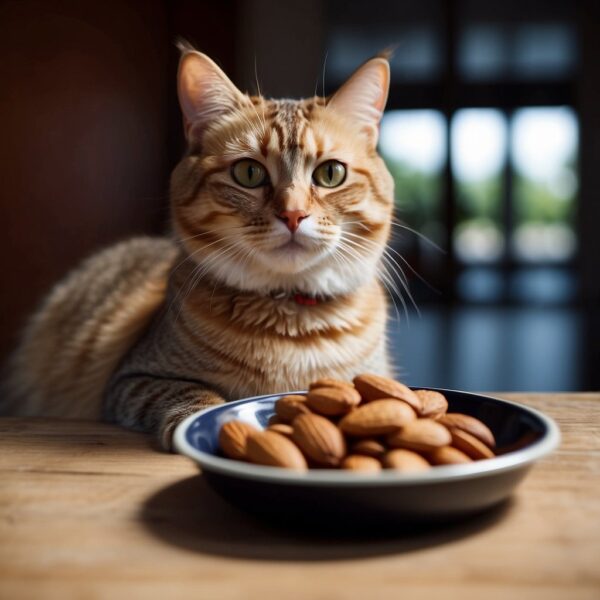
Cats eating almonds: Frequently Asked Questions
In considering whether cats can eat almonds, owners should be well-informed about potential symptoms of toxicity, alternative safe foods, and appropriate actions in case of accidental nut ingestion.
What symptoms should I look for if my cat ingests nuts?
If a cat ingests nuts, owners should watch for symptoms such as vomiting, diarrhea, and lethargy, which might indicate a negative reaction or possible toxicity. Particularly with almonds, though non-toxic, they might still cause gastrointestinal upset.
Are any nuts safe for feline consumption?
Most nuts are not recommended for cats due to their high fat content and potential choking hazard. Some nuts could also contain toxins harmful to cats. Therefore, it’s safer to avoid feeding nuts to felines altogether.
How should I respond if my cat has eaten a potentially harmful nut?
Should a cat consume a harmful nut, the owner must immediately contact a veterinarian. Quick professional advice is crucial to determine the appropriate course of action, which might include inducing vomiting or providing activated charcoal.
Is there a risk of toxicity with almond milk and cats?
Almond milk does not contain the same risks as almonds themselves, but it’s not recommended for cats.
Can cats have complications after eating nut products?
Yes, cats can experience complications after eating nut products, such as gastrointestinal upset or obstruction due to the size or shape of nuts. These complications can occur even if the nuts are not toxic themselves.
Are there any safe alternative human foods for cats?
Cats can safely enjoy small portions of cooked lean meats like chicken or turkey. It’s important to avoid seasonings and bones. Any human food should only be a small part of a cat’s diet, which should be primarily high-quality cat food.